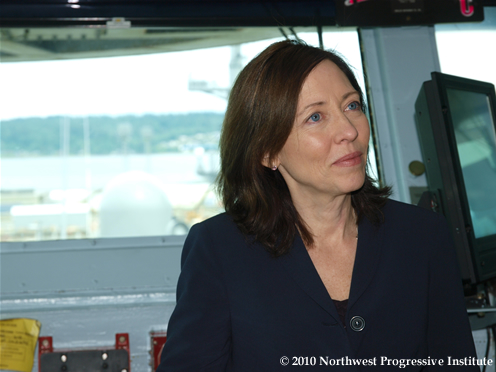Senator Cantwell talks to NPI about energy security (on the bridge of an aircraft carrier!)
The Stennis, built in the early nineties at Newport News, was engineered to last fifty years. She is powered by two nuclear reactors, and has a top speed of more than thirty knots (equivalent to 34.5 miles per hour). She can carry more than seventy tactical aircraft, which can be moved above or below decks using four flight elevators. She is the flagship of her strike group.
The tour was short, but very informative. The ship's commanding officers took us up to the bridge, where we had an excellent view of our surroundings: the base itself, Sinclair Inlet, and the City of Bremerton.

Above: View of the flight deck from the bridge of the USS John C. Stennis.
Senator Cantwell took in the sights whilst conversing with Captain Joe Kuzmick and Rear Admiral Joe Aucoin about the ship's capabilities, U.S. military readiness, and the Navy's initiatives to become more energy efficient.
They also discussed how the service had evolved culturally, permitting stronger retention of talented and energetic young people.
"The old image of a sailor was some ruffian you pulled off a pier — way long ago — cut up a sail, made 'em a uniform," Kuzmick observed. "We've moved on. The sailors are much more professional, more technically oriented these days. And we're trying to give them a more professional place to live."
"This crew is about nineteen percent women," noted Captain Michael Wettlaufer, who serves as the ship's executive officer.
"Nineteen percent?" Senator Cantwell asked. "Nineteen percent women?"
"Yes, ma'am," he affirmed.
She didn't say so, but perhaps she was marveling at the fact that the Stennis has more women serving (as a percentage of its total crew) than either the U.S. House of Representatives or Senate does.
"That's a remarkable change from... certainly, our service in the military. It's grown dramatically. And I think having the quality of life off the ship also helps some of those retention tools, so we don't have to pay to retrain people, we can [give] people an opportunity to stay in the Navy," Wettlaufer added.

Above: Senator Cantwell listens as Captain Kuzmick and Rear Admiral Aucoin review the Stennis' operational history.
A little later, before we departed the bridge, I had the opportunity to talk to Senator Cantwell, and I asked her about making energy security a priority. And more specifically, not paying lip service to the idea (which happens all the time), but actually realizing it by investing our common wealth.
ANDREW: For the last thirty years, we've been talking about energy security. And recently a group of veterans did a national bus tour called Operation Free to talk about the importance to the military of getting off of fossil fuels. But it doesn't seem like we're putting our money where our mouth is, 'cause we had President Carter talking about renewable energy, and President Clinton talking about renewable energy, and now President Obama... What's going on? Why aren't putting our money where our [collective] mouth is?We at NPI wish America had more senators who were of the same mind as Senator Cantwell. Not trapped in the age of petroleum, but people who could look forward, beyond the horizon. It really is hard to think long-term and it's even harder to appreciate the importance of sustainability. It requires a willingness to learn.
SENATOR CANTWELL: Well, one thing is, the Navy really is - out of the entire U.S. federal government - probably leading the way on the most innovation as it relates to diversifying off of fossil fuel. But that said, the federal government could do more, and I think that we should look across all agencies — not just the Navy — but all agencies, and have the federal government be a beachhead for diversifying off of fossil fuel. All the fleets of cars that they use, a whole variety of things —
ANDREW: Motor vehicle pool?
SENATOR CANTWELL: Yes. And be more aggressive. That was our original intent, in the 2008 energy bill that was passed. And the 2005 energy bill had some of that same language in it, pushing the federal government to meet certain goals and deadlines. But, the truth is, you know, we now see from this very tragic event [the Deepwater Horizon disaster] that the urgency [is great].
We only have two percent of the world's oil reserves, in the United States. So, it's not as if we are going to change the price at the pump by what we can do by drilling off our coasts. And so it shows you how dangerous it is to do this... In the '70s, when Carter led the charge — basically because of the OPEC embargo and what was happening in the Middle East — we significantly reduced home heating oil in America. I can't remember the percent, but it was something like twenty percent. And people went on to natural gas and other things.
But you're right. After that time period passed, people forgot about it. And the truth is, we are going to be at peak oil. And if we don't diversify off of that, you know, in thirty years, we're going to have serious problems. And... I think that's what the military realizes, and that's why the Navy and others have started to diversify, because they know that we can't be in a situation where we're continuing to be dependent. If we said we were going to run out of water in thirty years, I guarantee you we'd be doing something about it.
ANDREW: We don't have another thirty year time cushion, is what you're saying.
SENATOR CANTWELL: No. That's right. We need to diversify now. And... I think it can be one of the biggest job creators that we've ever seen. The change that's happened in energy is really distributed generation. That generation can now be in lots of different places from lots of different sources, just like you used to have mainframe computers and now you can have a computer on every desk. It's the same kind of opportunity. And that could create a lot of jobs. It's a six trillion dollar industry, energy. Clean energy for the future. I mean, the Internet was only, you know, like two trillion. So, when you think of that way, it's a huge job creator.
It seems like Republicans have an especially hard time thinking long term because they're always looking backwards, to some point in the past that might as well be ancient history. They will preserve the status quo for as long as they can if we let them... right of the edge of a figurative cliff. Their thirst for oil really symbolizes all that's wrong with America today: A society obsessed with instant gratification and material wealth. A society infected with affluenza.
All the big problems we're dealing with right now, we've known about for a long time, since before I even existed. We made some progress under Carter, and under Clinton, but their presidencies were followed by twelve and eight years, respectively, of Republican dithering. That totals up to two lost decades. All that time we could have been preparing ourselves for the inevitable end of oil.
But instead, we acted as if the world has an unlimited supply, and we can burn as much of it as we want if we only drill deeper.
Now our current president is once again cautiously trying to move us forward, but he's not getting any help from the party out of power. Congressional Republicans aren't serving as a loyal opposition; they're just an opposition.
Thanks to the rules of the Senate, they unfortunately have the power to block Senator Cantwell and her Democratic colleagues from advancing legislation that would put our common wealth to work in pursuit of the goal of energy security.
We cannot afford to let them win again. We are already on the edge of the precipice. Our ability to project power around the globe is gravely threatened so long as our military is dependent on dirty fossil fuels. Our Navy may be unparalleled in its strength in almost every dimension, but its reliance on oil is a key weakness that jeopardizes its ability to carry out its mission. Addressing that weakness would make our entire country safer and stronger.

Comments:
Post a Comment